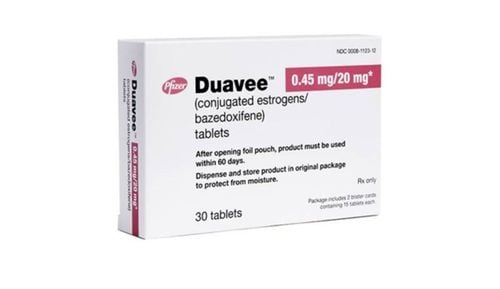This is an automatically translated article.
The article was professionally consulted by Specialist Doctor I Nguyen Thi Man - Department of Obstetrics and Gynecology - Vinmec International General Hospital Da Nang.The average age at which natural menopause begins is 51, however, due to genetics, disease or treatments, some women reach menopause before the age of 40. Menopause that occurs before this age, whether natural or caused, is called premature menopause.
1. What are the symptoms of early menopause?
Symptoms of early menopause are often the same as those of women going through natural menopause including: Irregular or missed periods; heavier or lighter menstrual periods than usual; hot flashes,... These symptoms are a sign that the ovaries are producing less estrogen.
Along with the above symptoms, some women may experience:
Vaginal dryness. Overactive bladder and poor bladder control (incontinence). Emotional changes (irritability, mood swings, mild depression). Dry skin, dry eyes or dry mouth. Insomnia. Reduced sex drive. In addition to the symptoms listed above, if you are under the age of 40 and experience any of the following conditions, you should see your doctor to determine if you are experiencing early perimenopause:
You have had treatment chemotherapy or radiation therapy. You or a family member has an autoimmune disorder such as hypothyroidism, Graves disease, or lupus erythematosus. You've been trying to get pregnant without success for more than a year. Your mother or sister had early perimenopause. In addition to dealing with hot flashes, mood swings, and other symptoms of perimenopause, many women with early menopause have to deal with physical and emotional concerns like decreased libido. sex, desire to get pregnant.

2. How do I know if I have early or early menopause?
You can recognize the typical symptom of early menopause when you have not had a period for 12 consecutive months before the age of 40.
To diagnose early menopause, your doctor will perform a physical exam and draw blood to rule out other conditions, such as pregnancy and thyroid problems. Additionally, your doctor will likely order estradiol levels to be checked. Low levels of estradiol (a form of estrogen) may indicate that your ovaries are starting to reduce hormone production. When estradiol levels are below 30, this is a sign that you are in menopause.
However, the most important test used to diagnose early menopause is the follicle-stimulating hormone (FSH) test. FSH is a hormone of the anterior pituitary gland, which promotes the development of oocytes and stimulates the secretion of estrogen in the ovarian capsule. When the ovaries slow down in estrogen production, your FSH level goes up. If FSH levels rise above 40 mIU/mL, this is a sign that you are in menopause.
3. Causes of early menopause
Premature menopause can happen on its own for no apparent reason, or it can happen because of certain surgeries, medications, or health conditions, including:
Family history. Women with a family history of early menopause are more likely to develop early menopause than women who do not have the condition. Smoke . Many studies have shown that female smokers reach perimenopause and menopause two years earlier than non-smokers. In addition, the menopausal symptoms of women who smoked were more severe and died about two years earlier than those of women who did not smoke. Chemotherapy or radiation therapy to the pelvis to treat cancer. These treatments can damage the ovaries and cause periods to stop permanently or for a period of time making it difficult or impossible to get pregnant. Not all women who have chemotherapy or radiation therapy will experience perimenopause and early menopause. The younger a woman is at the time of chemotherapy or radiation, the less likely she is to experience early menopause. Surgical removal of the ovaries. Surgery to remove both ovaries can cause immediate menopause symptoms with typical symptoms such as missed menstrual cycles after surgery and a rapid drop in hormone levels, hot flashes, and decreased libido. sex. Surgical removal of the uterus. Some women have a hysterectomy, which removes the uterus but can keep the ovaries, preventing the woman from menstruating or becoming pregnant. However, unlike the above surgical removal of the ovaries, the patient may not immediately reach menopause because the ovaries will continue to make hormones. However, in the future, this patient will go through natural menopause a year or two earlier than expected. Some other diseases:
Autoimmune diseases, such as thyroid disease and rheumatoid arthritis. Normally, the body's immune system will fight pathogens and disease-causing factors to protect the body, but in the case of patients with autoimmune diseases, the immune system can mistakenly attack the ovaries and cause damage to the ovaries. This organ does not make hormones. HIV and AIDS . Women who have HIV but are not well controlled by medication may experience early menopause. In addition, women with HIV may also have more severe hot flashes than women without HIV. Missing chromosomes. Women who are born with a chromosome deficiency or a problem with their chromosomes may experience early menopause. For example, women with Turner syndrome are born without an X chromosome, so their ovaries do not develop normally, leading to irregularities in the menstrual cycle and the timing of menopause. Chronic fatigue syndrome causes extreme fatigue in women, muscle weakness, muscle and joint pain, memory loss, headaches, poor sleep... Research has found that women People with this syndrome are more likely to have an early menopause.

4. How does early menopause affect health?
Women who go through early menopause may have the same symptoms or health problems as those who go through menopause at the right age such as:
High risk of serious health problems, such as heart disease and osteoporosis due to a lack of the hormone estrogen. Menopausal symptoms are more severe. Talk to your doctor about treatments to help ease your symptoms if they affect your daily life. Anxiety or depression because of early loss of fertility or changes in the body. Talk to your doctor if you have symptoms of depression such as lack of energy or decreased interest/interest in things you used to enjoy that last for several weeks. Your doctor may recommend psychologists who can help you deal with emotional problems. Your doctor can also discuss options like adoption or using donor eggs if you want to have children. Currently, Vinmec International General Hospital has a package of pre-menopausal health examination and counseling. When registering for an examination package, customers will be examined and consulted with a specialist in Gynecology; Perform tests to evaluate hormonal status such as:
Gynecological examination. Gynecological examination, breast examination. Transabdominal ultrasound of the uterus and ovaries. Take samples for cervical-vaginal cytology. Mammogram (2 sides). Measure osteoporosis. Perform other tests to detect perimenopausal conditions, if any. Specialist Doctor I Nguyen Thi Man was former Head of Obstetrics Department - Tam Tri Da Nang General Hospital, Head of IUI Unit (Intrauterine Insemination) - Hoan My Hospital - Da Nang. The doctor has more than 10 years of experience in diagnosing, consulting and treating in the field of Obstetrics and Gynecology such as:
Infertility examination and consultation, implementation of assisted reproductive techniques such as: Ovulation monitoring, intrauterine insemination (IUI) Examination, ultrasound, screening and treatment of gynecological diseases Laparoscopic surgery for ovarian cysts, ectopic pregnancy
Please dial HOTLINE for more information or register for an appointment HERE. Download MyVinmec app to make appointments faster and to manage your bookings easily.
References: Webmd.com and Healthline.com













